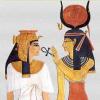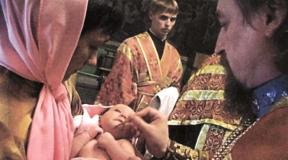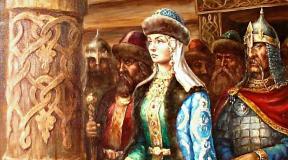Spiritual guidelines of a person. Man as a Spiritual Being - Knowledge Hypermarket
QUESTIONS FOR SELF-TEST
1. What are the spiritual and moral guidelines of a person, what is their role in his activities?
Spiritual and moral guidelines of a person are what a person should strive for in spiritual and moral terms. Their role in human activity is very great, because his actions, actions will directly depend on spiritual and moral guidelines. A person who has a developed spiritual life has, as a rule, an important personal quality: his spirituality means striving for the height of ideals and thoughts that determine the direction of all activity, therefore, some researchers characterize spirituality as a morally oriented will and mind of a person.
On the contrary, a person whose spiritual life is not developed, is spiritless, unable to see and feel all the diversity and beauty of the surrounding world.
2. What is the essence of the categorical imperative?
A categorical imperative is an unconditional compulsory demand (command) that does not allow objections, binding for all people, regardless of their origin, position, circumstances. And as Kant argued, there is only one categorical imperative: "always act according to such a maxim, the universality of which as a law you can at the same time desire" (maxim is the highest principle, the highest rule). The categorical imperative affirms a person's personal responsibility for the acts committed by him, teaches not to do to another what you do not wish for yourself. Consequently, these propositions, like morality in general, are humanistic in nature, for the “other” acts as a Friend. This is the essence of the categorical imperative.
3. What are moral values? Describe them.
Moral values \u200b\u200bare essential moral values, what is dear to a person in himself and in others: life, honor.
4. Why is the formation of human moral qualities impossible without self-education?
If a person does not have self-education (self-control), then he will not be able to get "experience of good deeds", therefore, become morally rich.
5. What is the essence of a worldview? Why is the worldview often called the core of the spiritual world of the individual?
The essence of the worldview consists in the totality of a person's views on the world that surrounds him, therefore it is often called the core of the spiritual world of the individual. Worldview is the basis of human spirituality.
6. What types of worldview does science distinguish? What characterizes each of them?
Science identifies the following types of worldview: 1. ordinary - built on their own experience, formed spontaneously; 2. religious - the basis of this worldview is religion; and 3. scientific - is based on the achievements of science.
7. What is common in the concepts of "morality" and "worldview"? What is their difference?
General - both morality and worldview are a complex and a system. And the difference is worldview different people may be different, but morality is one.
8. What is the significance of the worldview for human activity?
Relying on the worldview, a person can act one way or another, because he proceeds from his views.
TASKS
1. Do you think morality forces a person to act in a certain way, or does it give freedom? Give reasons for your answer.
Morality always acts as moderation, the ability to self-restraint; at all times and among all peoples it was associated with restraint, close to asceticism (asceticism is a person's ability to limit himself, to impose, if necessary, a ban on his natural desires). From this concept, we see that morality forces a person to act in a certain way.
2. Scientists argue that value orientations determine life goals person, "the general line of the individual." Do you agree with this statement? Argument your position.
Yes, I agree with this opinion, really value orientations determine the life goals of a person, because value orientations are the core of a person, those guidelines that guide human activity.
3. The English thinker Adam Smith noted the importance of a wise and constructive way of acting, combining prudence with valor, with love for humanity, with sacred respect for justice, with heroism. "This prudence," said Adam Smith, "involves combining a superior head with a superior heart." How do you understand the author's thesis about "uniting an excellent head with an excellent heart"? What, in your opinion, is the connection between this provision and moral values?
Have good man everything should be excellent, both mind and heart. Any person before doing something should think with his head and listen to his heart. From the moral point of view, if a person listens to his heart, he will not act cruel and self-serving.
4. Academician BV Rauschenbach wrote: "Is it not alarming that the characteristics of" successful businessman "," good organizer of production "are sometimes more important than the assessment of" decent person "?" Do you agree with the opinion of the scientist? Give reasons for your position. Try to formulate your definition of "decency".
Decency is the moral quality of a person who always strives to fulfill his promises and does not intentionally harm others. The characteristics “successful businessman”, “good production organizer” are not always more important than the rating “decent person”, because both a businessman and a production organizer can also be decent people. Of course, in modern society, it is very important that people who have held certain positions are decent.
5. Russian sociologists conducted a study of the values \u200b\u200bof students. The students named the following value orientations most important for themselves in life: to get a good education - 29% of the respondents; have an interesting job - 34%; get a prestigious job - 26%; to achieve material wealth - 42%; have good health - 50 %; my family - 70%; to enjoy life - 26%. Called something else or found it difficult to answer - 5% of the surveyed students. How do you feel about these results? What values \u200b\u200bfrom the above list do you consider the most important for yourself? What would you add to this list?
From this list of values, the family comes first; the second place is taken by health, the third is material prosperity.
For myself, I would also keep this sequence. It is very important that in modern society the family and spiritual values \u200b\u200bare valuable, and material wealth goes to the background.
"The ideal of man" - The concept of reality in general has become one of the most vague in our time. A. Marinina's success is largely due to the effect of “self-recognition”. Research of works of various genres of modern Russian literature. "We are brave heroes of very small stature." Favorite heroes of the children are the characters in the books of brothers A. and B. Strugatsky, S. Lukyanenko.
"Human Values" - Moral class hour. While a person lives, he always thinks about something. A loser person is a person who ... Having gone to the world of prices, one must not forget to return to the world of values. A successful person in life is a person who ... Luxury corrupts. A minute of revelation. We want to eat - you can eat bread and salt and that's it.
"Spiritual development" - Affirms the truth only by proof; All human connections with the world. Helps in spiritual development to see the "dialectic of the soul"; Creates tremendous value in art, music, architecture and literature. All the diversity of objective reality; Religion as a source spiritual development... Stimulates the development of cognitive capabilities, creativity;
"Moral test" - 3. Criteria of morality are determined by: The period of history By the people themselves The policy of the state. on the topic "Personality and moral responsibility". 3. Designate the norms with numbers: 1 - moral; 2- legal. Morality is based on: Humanism Responsibility Morality. Do so that the people around you feel good about it ”V. A. Sukhomlinsky.
"Ethical morality" - The concept of ethics. The concept of morality. Topic 2 Ethics of merchandising activities. Features of morality. Translated from Greek, "ethics" means custom, disposition. Highest moral values. Moral norms. Ethical culture of service. The purpose of ethics. Ethical culture. Ethics challenge.
"Values" - Model of the hierarchy of values. Social needs are also met by certain values \u200b\u200b- such as social security, employment, civil society, state, church, trade union, party, etc. Values \u200b\u200bchange with the development of society. Values-goals and values-means Taking into account the role of values \u200b\u200bin human life, they distinguish values-goals and values-means.
You already know that, being a social being, a person cannot but obey certain rules. This is a necessary condition for the survival of the human race, the integrity of society, the sustainability of its development. At the same time, the established rules, or norms, are designed to protect the interests and dignity of each individual. The most important are the norms of morality. Morality is a system of norms, rules governing communication and behavior of people, ensuring the unity of public and personal interests.
Who sets moral standards? Different answers are given to this question. The position of those who consider the activities and commandments of the great teachers of mankind: Confucius, Buddha, Moses, Jesus Christ, are very authoritative.
In the sacred books of many religions, a well-known rule is recorded, which in the Bible reads as follows: "... In everything you want people to do to you, do the same with them."
Thus, even in deep antiquity, the foundation was laid for the main universal human normative moral requirement, which was later called the “golden rule” of morality. It reads: "Act towards others as you would like others to act towards you."
According to another point of view, the norms and rules of morality are formed in a natural - historical way - and are derived from mass everyday practice.
Based on the available experience, humanity has developed basic moral prohibitions and requirements: not to kill, not to steal, help in trouble, tell the truth, keep promises. At all times, greed, cowardice, deception, hypocrisy, cruelty, envy were condemned and, on the contrary, freedom, love, honesty, generosity, kindness, hard work, modesty, loyalty, mercy were approved. In the proverbs of the Russian people, honor and reason were inextricably linked: "Honor gives birth to the mind, and dishonor and the latter takes away."
The moral attitudes of the personality were investigated major philosophers... One of them is I. Kant. He formulated a categorical moral imperative, the adherence to which is very important for the implementation of moral guidelines for activity.
A categorical imperative is an unconditional compulsory demand (command) that does not allow objections, binding for all people, regardless of their origin, position, circumstances.
How does Kant characterize the categorical imperative? Here is one of his wording (think it over and compare with the "golden rule"). There is, Kant argued, only one categorical imperative: "always act according to such a maxim, the universality of which as a law you can at the same time desire." (Maxima is the highest principle, the highest rule.) The categorical imperative, like the "golden rule", affirms the personal responsibility of a person for the acts he has committed, teaches not to do to another what you do not wish for yourself. Consequently, these propositions, like morality in general, are humanistic in nature, for the “other” acts as a Friend. Speaking about the meaning of the "golden rule" and the categorical imperative of I. Kant, the famous philosopher of the XX century. K. Popper (1902-1994) wrote that "no other thought has had such a powerful influence on the moral development of mankind."
In addition to direct norms of behavior, morality also includes ideals, values, categories (the most general, fundamental concepts).
Ideal - This is perfection, the highest goal of human striving, the idea of \u200b\u200bthe highest moral requirements, the most sublime in man. These ideas of the best, the valuable and the majestic are called by some scientists "modeling the desired future", which meets the interests and needs of man. Values \u200b\u200bare what is most precious, sacred both for one person and for all mankind. When it comes about the negative attitude of people to certain phenomena, about what they reject, the terms "anti-values" or "negative values" are often used. Values \u200b\u200breflect a person's attitude to reality (to certain facts, events, phenomena), to other people, to himself. These relationships can be different in different cultures and at different nations or social groups.
On the basis of the values \u200b\u200bthat people accept and profess, human relations are built, priorities are determined, and goals of activity are put forward. Values \u200b\u200bcan be legal, political, religious, artistic, professional, moral.
The most important moral values \u200b\u200bconstitute a system of human value and moral orientation, inextricably linked with the categories of morality. Moral categories are of a pair-relative (bipolar) nature, for example, good and evil.
The category "good", in turn, also serves as the backbone of moral concepts. Ethical tradition says: "Everything that is considered moral, morally obligatory, is good." The concept of "evil" concentrates the collective meaning of the immoral, opposed to the morally valuable. Along with the concept of “good”, the concept of “virtue” (to do good) is also mentioned, which serves as a generalized characteristic of the persistently positive moral qualities of the individual. A virtuous person is an active, moral person. The opposite of the concept of "virtue" is the concept of "vice".
Also, one of the most important moral categories is conscience. Conscience is the ability of an individual to learn ethical values \u200b\u200band be guided by them in all life situations, independently formulate their moral obligations, exercise moral self-control, be aware of their duty to other people.
Poet Osip Mandelstam wrote: ... Your conscience: The knot of life, in which we are recognized ...
There is no morality without conscience. Conscience is an internal judgment that a person exercises over himself. "Remorse," wrote Adam Smith more than two centuries ago, "is the most terrible feeling in the human heart."
Among the most important values \u200b\u200bare also patriotism... This concept denotes the value attitude of a person to his Fatherland, devotion and love to the Motherland, his people. The patriotic person is committed national traditions, social and political structure, language and faith of their people. Patriotism manifests itself in pride in the achievements of the native country, in empathy with its failures and troubles, in respect for its historical past, for the people's memory and culture. You know from the history course that patriotism originated in ancient times. It manifested itself noticeably during periods when there was a danger for the country. (Remember the events of the Patriotic War of 1812, the Great Patriotic War of 1941-1945.)
Conscious patriotism as a moral and socio-political principle presupposes a sober assessment of the successes and weaknesses of the Fatherland, as well as a respectful attitude towards other peoples and a different culture. The attitude towards another people is the criterion that distinguishes a patriot from a nationalist, that is, a person who seeks to put his own people above others. Patriotic feelings and ideas only morally uplift a person when they are coupled with respect for people of different nationalities.
The qualities of citizenship are also associated with patriotic orientations of a person. These socio-psychological and moral qualities of a person combine both a feeling of love for the Motherland, and responsibility for the normal development of its social and political institutions, and the awareness of oneself as a full-fledged citizen with a set of rights and obligations. Citizenship is manifested in the knowledge and ability to use and protect personal rights, respect for the rights of other citizens, observance of the Constitution and laws of the country, and the strict fulfillment of their duties.
Are moral principles formed in a person spontaneously or do they need to be formed consciously?
In the history of philosophical and ethical thought, there was a point of view according to which moral qualities are inherent in a person from the moment of birth. Thus, the French enlighteners believed that man is by nature good. Some representatives of Eastern philosophy believed that man, on the contrary, is by nature evil and is the bearer of evil. However, the study of the process of the formation of moral consciousness showed that there are no grounds for such categorical statements. Moral principles are not inherent in a person from birth, but are formed in the family by the example that is in front of his eyes; in the process of communicating with other people, during the period of education and upbringing at school, with the perception of such monuments of world culture that allow you to both join the level already achieved moral consciousnessand to form their own moral values \u200b\u200bon the basis of self-education. Self-education of the individual is not the last place. The ability to feel, understand, do good, recognize evil, be persistent and irreconcilable to it are special moral qualities of a person that a person cannot receive ready from others, but must develop independently.
Self-education in the field of morality is, first of all, self-control, the presentation of high demands on oneself in all types of one's activities. The assertion of morality in consciousness, the activities of each person is facilitated by the repeated implementation of positive moral standards by each person, or, in other words, the experience of good deeds. If there is no such repetition, then, as studies show, the mechanism of moral development “deteriorates” and “rusts”, the ability of a person to make independent moral decisions, which is so necessary for activity, is undermined, his ability to rely on himself and be responsible for himself.
Spiritual guidelines of the individual: morality, values, ideals. Morality is a system of norms, rules governing communication and behavior of people, ensuring the unity of public and personal interests. The "golden rule" of morality: "Act towards others as you would like others to act towards you." A categorical imperative is an unconditional compulsory requirement that does not allow objections, binding on all people, regardless of origin, position, circumstances. The philosopher I. Kant formulated the categorical imperative of morality: "Always act in such a maxim, the universality of which as a law you can at the same time desire."
Slide 4 from presentation "Features of Spiritual Life"... The size of the archive with the presentation is 208 KB.Philosophy Grade 10
summary other presentations"Modern Science" is a social institution with its own structure and functions. Sopromat, termekh. Natural sciences. Social responsibility. Scientists. Types of science. A set of systematized knowledge in any branch of science. Do no harm. Social sciences. The science. A special system of knowledge. Increase in humanizing influence. Internal laws of science. Striving for truth. Science of knowledge and thinking. Science is the most important, the most beautiful and necessary in human life.
"Morality and ethics" - The main problems and trends of the modern cultural situation. The moral culture of the individual. Development of moral norms. Questions of the origin of morality. Morality and law: common and differences. Trends in the spiritual life of modern Russia. Moral requirements and views. Differences. The most important principles of modern moral culture of the individual. Religion. The structure of the moral culture of the individual. Ethics - philosophical science, the subject of study of which is morality.
"Social cognition" - Types of social facts. Social cognition. Cognition -. Features: social cognition... Products of material or spiritual activities of people. In the narrow sense, it is a cognizable object. A specific historical approach to social phenomena... Verbal social facts: opinions, judgments, assessments of people. In a broad sense - society. The most common method of social research is scientific abstraction.
"Scientific and technical revolution" - Engineering and technology. Homeland of technopolises. The science. Definition of the concept of "scientific and technological revolution". Control. The value of the scientific and technological revolution. Electronization. Science expenses. Character traits NTR. R&D funding by region of the world. Scientific and technological revolution. Technoparks and technopolises in the USA. Reconstruction of the energy sector. Assimilation of the essence of scientific and technological revolution. Leading countries by the number of registered patents. High level. Improvement of already known techniques.
"Worldview" - Turn to the person. Types of worldviews. Strong side... The notion of a categorical imperative. One of the classifications of types of worldviews. About justice. Worldview. What is worldview. About good. Types of worldview. About wealth. Hatred is intense enmity, aversion to someone or something. What is the essence of the worldview. We all walk under one God, although we do not believe in one. Ordinary worldview.
"Spiritual life of society" - Components of culture. Conformity. A number of concepts. Mass and elite culture. Culture and spiritual life of society. A layer of educated and thinking people. What is the broadest sense of the concept of "culture". Spiritual world personality. Culture is all types of transformative human activity. Reproduction and transformation of reality in artistic images. Painting of avant-garde artists.
Any person does not live by himself, he is surrounded by other people. He must live in society, obeying the established requirements. This is necessary for the survival of humanity, the preservation of the unity of society and the reliability of its improvement. But society does not require a person to sacrifice their own material interests for the sake of him, because the principles are approved, designed to defend the needs and benefits of an individual. The moral foundations and spiritual guidelines of the individual are paramount.
The spirituality of human life
Courage of people coincides with their awareness of themselves as individuals: they try to evaluate personal moral qualities and develop a sphere of spiritual addictions, including erudition, beliefs, emotions, sensations, desires, and inclinations. Science defines the spirituality of human society as the full range of emotions and intellectual conquests of humanity. It concentrates knowledge and research of all spiritual traditions perceived by human society and the creative creation of the latest values.
A spiritually developed individual is distinguished by significant subjective characteristics, strives for lofty spiritual goals and designs that determine the nature of his initiatives. Scientists consider spirituality to be an ethical aspiration and human consciousness. Spirituality is seen as understanding and life experience. People with weak or completely soulless are unable to perceive all the many-sidedness and splendor of what surrounds them.
The advanced worldview considers spirituality to be the highest stage of the formation and self-determination of an adult individual, when the basis and life essence are not personal desires and perceptions, but the main human priorities:
- good;
- mercy;
- beautiful.
Mastering them forms a value orientation, a conscious readiness of society to change life in accordance with these principles. This is especially important for young people.
The origin of morality and its study
Morality means a complex of customs and canons that regulate contacts and communication of people, their actions and manners, as well as serve as a guarantee of harmony of collective and personal needs. Moral rules have been known since ancient times. There are different points of view on the sources of the emergence of moral norms. It is believed that their primary source was the practice and sermons of the greatest mentors and teachers of mankind:
- Christ;
- Confucius;
- Buddha;
- Muhammad.
 Theological manuscripts of most beliefs contain a textbook principle, which later became the highest law of morality. He recommends a person to act with people as he would like to be treated with him. On this basis, the basis of the primary regulatory ethical prescription was laid in the culture of hoary antiquity.
Theological manuscripts of most beliefs contain a textbook principle, which later became the highest law of morality. He recommends a person to act with people as he would like to be treated with him. On this basis, the basis of the primary regulatory ethical prescription was laid in the culture of hoary antiquity.
An alternative point of view states that moral principles and the canons are formed historically and are borrowed from numerous everyday experience. Literature and education contribute to this. Relying on existing practice has allowed humanity to form key moral orientations, prescriptions and prohibitions:
- do not shed blood;
- do not kidnap someone else;
- not to deceive and not to testify;
- help out a neighbor in difficult circumstances;
- keep your word, fulfill your covenants.
In any era, it was censured:
- greed and stinginess;
- cowardice and indecision;
- deceit and double-mindedness;
- inhumanity and cruelty;
- treachery and deceit.
The following properties were approved:
- decency and nobility;
- honesty and honesty;
- disinterestedness and spiritual generosity;
- responsiveness and humanity;
- diligence and diligence;
- restraint and moderation;
- reliability and dedication;
- responsiveness and compassion.
The people reflected these qualities in proverbs and sayings.
Remarkable philosophers of the past studied spiritual and moral human guidelines. I. Kant deduced a formulation of the categorical requirement of morality, which coincides in content with the golden principle of morality. This approach states the personal responsibility of the individual for the deed.
Fundamental concepts of morality
In addition to direct regulation of the way of action, morality also contains ideals and values \u200b\u200b- the embodiment of all the best, exemplary, irreproachable, significant and noble in people. The ideal is considered the standard, the height of perfection, the crown of creation - what a person should strive for. Values \u200b\u200bare called especially valuable and revered not only for one person, but for all of humanity. They show the relationship of the individual with reality, with other people and with himself.

Anti-values \u200b\u200breflect the negative attitude of people towards specific manifestations. Such assessments are dissimilar in different civilizations, among different nationalities, in different social categories. But on their basis human relationships are built, priority is established, the most important attitudes are indicated. Values \u200b\u200bare divided into the following categories:
- legal, or legitimate;
- state and legal;
- pious;
- aesthetic and creative;
- spiritual and moral.
Primary moral values \u200b\u200bform a complex of traditional and moral orientation of a person, coupled with the concept of morality. Among the main categories are good and evil, virtue and vice, correlated in pairs, as well as conscience, patriotism.
Taking morality in his thoughts and activities, the individual must control his actions and desires, and place increased demands on himself. Regular implementation of positive deeds strengthens morality in consciousness, and the absence of such deeds undermines the ability of humanity to make independent moral decisions, responsibility for their actions.



















